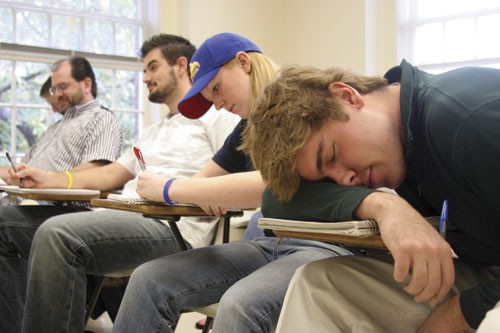The Science of Adolescent Sleep
MAY 22, 2017 | By PERRI KLASS, M.D. | NYTimes.com
 Why do children wake up early when they are young but want to stay in bed till noon as teenagers?
Why do children wake up early when they are young but want to stay in bed till noon as teenagers?
Experts say it’s biology. Adolescents’ bodies want to stay up late and sleep late, putting them out of sync with what their school schedules demand of them. So kids have trouble waking up, and they often find themselves feeling drowsy in morning algebra class.
But that chronic sleepiness can affect their health and well-being, their behavior, and even their safety; it becomes genuinely dangerous when sleepy teenagers get behind the wheel.
At a recent conference on adolescent sleep, health and school start times, at which I gave a brief keynote, several experts made compelling arguments supporting the idea that middle and high school start times should shift to 8:30 a.m. or later, as recommended by the American Academy of Pediatrics and the American Academy of Sleep Medicine.
Brian Tefft, a senior researcher with the AAA Foundation for Traffic Safety, talked about “drowsy driving.” He cited an annual study that asks, “In the past 30 days how often have you driven when you were so tired that you had a hard time keeping your eyes open?” Over the past five years, on average, a quarter of the 16- to 18-year-old licensed drivers reported driving in that condition at least once, and 2 percent said fairly often or regularly.
The argument is that teenagers who face very early school start times are at risk of regular sleep deprivation. Driving after sleeping only four to five hours a night is associated with a similar crash risk as driving with an alcohol level at the legal limit. Sleeping less than four hours puts you at the same risk as driving with double the legal alcohol limit. (This is not only true for adolescents, but for all of us.)
Drowsy driving may not be the only risk that tired teenagers take. Wendy Troxel, a clinical psychologist and senior behavioral and social scientist at RAND, talked about the “adolescent health paradox,” that teenagers, who are in a developmental period of physical strength and resilience, face disproportionately high mortality rates. Unintentional injury (especially car crashes) is high on the list of causes, followed by homicide and suicide.
“The onset of new cases of depression skyrockets when kids become teens,” Dr. Troxel said. And we spend a great deal of time, money and energy on programs to prevent adolescent violence and suicide, to counsel against substance abuse and unsafe sex — and not always successfully. Given the vulnerability, and the dramatic changes happening with development, researchers are looking for other ways to support adolescent brains and general well-being. “Sleep loss problems are linked with brain areas that control emotional processes and risk taking,” she said. “Sleep problems and behavioral and mental health problems are linked.” (She recently gave a TED talk on why school should start later for teens.)
The vision of those who organized the conference, led by Dr. Judith Owens, director of sleep medicine at Boston Children’s Hospital and Jim Healy, a retired investment banker who is a parent activist in Greenwich, Conn., on this issue, was to bring together scientists, doctors and community members and address an audience that included school officials and legislators.
Dr. Daniel Buysse, professor of sleep medicine at the University of Pittsburgh Medical Center and the author of a 2014 article on sleep health, spoke about what regulates sleep. There’s a sleep drive that builds up according to how long you’ve been awake, he said, and then dissipates as you sleep. Your 24-hour rhythm and your level of arousal and engagement from moment to moment also regulate sleep.
“How are these things affected in adolescents?” he asked. Their sleep drive takes longer to build up than it did in childhood, he said. “They don’t reach that critical level of sleepiness till a later time at night.”
A student who could handle elementary school starting at 9 a.m. may have to contend with middle school starting at 8 a.m. just as social demands and his or her own sleep cycle shift later, putting development, biology, social connections and academic expectations into conflict.
The brain needs sleep to replenish energy sources, said Dr. Charles A. Czeisler, a professor of sleep medicine at Harvard Medical School. “Sleep is critical to maintain focus and alertness, to repair and maintain brain cells, to clear out toxic metabolites,” he said.
Dr. Mary Carskadon, a professor of psychiatry and human behavior at Alpert Medical School of Brown University, spoke about the variety of developmental alterations that take place in adolescence, from changes in the brain to different patterns in metabolism, and the ways that sleep patterns are affected. Those same children who were once eager early risers, she said, begin staying up later and become, as many parents know, hard to rouse in the morning.
“Some people don’t get it, that this is biology,” she told me. “Adolescent sleep delay is not just in human teenagers; it’s seen in other juvenile mammals.”
And when they do wake up and get to school, their brain function is not at its best. Amy R. Wolfson, a professor of psychology at Loyola University in Maryland, and the co-editor of The Oxford Handbook of Infant, Child, and Adolescent Sleep and Behavior,said that high school students tend to perform better in courses that meet later in the day, and perform better on cognitive tests when they are given in the afternoon.
The adolescent response to chronic sleep loss may be to consume a great deal of caffeine, Dr. Troxel said, leading to a “tired but wired” state in which risk-taking becomes more likely, in a setting where adolescent biology is in conflict with academic expectations and school schedules.




